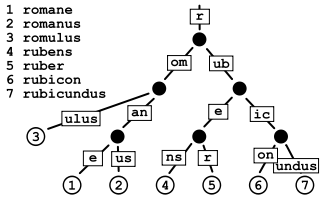这是未经测试的,但这是我的尝试。(我可能让它变得比我不得不做的更复杂,但我认为这是一种不同的看待它的方式。)
基本思想是编译在第一个元素处匹配的项目组,然后找到每个组的最大唯一索引,检查每个连续索引处的元素。
int FirstUniqueIndex<T>(IEnumerable<IEnumerable<T>> myArrayCollection)
{
//just an overload so you don't have to specify index 0 all the time
return FirstUniqueIndex(myArrayCollection, 0);
}
int FirstUniqueIndex<T>(IEnumerable<IEnumerable<T>> myArrayCollection, int StartIndex)
{
/* Group the current collection by the element at StartIndex, and
* return a collection of these groups. Additionally, we're only interested
* in the groups with more than one element, so only get those.*/
var groupsWithMatches = from var item in myArrayCollection //for each item in the collection (called "item")
where item.Length > StartIndex //that are long enough
group by item[StartIndex] into g //group them by the element at StartIndex, and call the group "g"
where g.Skip(1).Any() //only want groups with more than one element
select g; //add the group to the collection
/* Now "groupsWithMatches" is an enumeration of groups of inner matches of
* your original arrays. Let's process them... */
if(groupsWithMatches.Any())
//some matches were found - check the next index for each group
//(get the maximum unique index of all the matched groups)
return groupsWithMatches.Max(group => FirstUniqueIndex(group, StartIndex + 1));
else
//no matches found, all unique at this index
return StartIndex;
}
对于上述的非 LINQ 版本(我会将其更改为使用 List 集合,但任何集合都可以)。我什至会删除 lambda。再次未经测试,所以尽量不要将锋利的工具对准我的方向。
int FirstUniqueIndex<T>(List<List<T>> myArrayCollection, int StartIndex)
{
/* Group the current collection by the element at StartIndex, and
* return a collection of these groups. Additionally, we're only interested
* in the groups with more than one element, so only get those.*/
Dictionary<T, List<List<T>>> groupsWithMatches = new Dictionary<T, List<List<T>>>();
//group all the items by the element at StartIndex
foreach(var item in myArrayCollection)
{
if(item.Count > StartIndex)
{
List<List<T>> group;
if(!groups.TryGetValue(item[StartIndex], out group))
{
//new group, so make it first
group = new List<List<T>>();
groups.Add(item[StartIndex], group);
}
group.Add(Item);
}
}
/* Now "groups" is an enumeration of groups of inner matches of
* your original arrays. Let's get the groups with more than one item. */
List<List<List<T>>> groupsWithMatches = new List<List<List<T>>>(groups.Count);
foreach(List<List<T> group in groupsWithMatches)
{
if(group.Count > 1)
groupsWithMatches.Add(group);
}
if(groupsWithMatches.Count > 0)
{
//some matches were found - check the next index for each group
//(get the maximum unique index of all the matched groups)
int max = -1;
foreach(List<List<T>> group in groupsWithMatches)
{
int index = FirstUniqueIndex(group, StartIndex + 1);
max = index > max ? index : max;
}
return max;
}
else
{
//no matches found, all unique at this index
return StartIndex;
}
}
